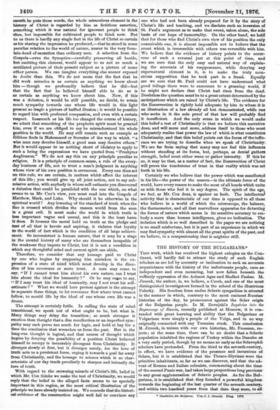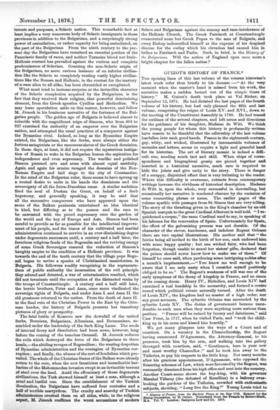THE HISTORY OF THE BULGARIANS.*
THIS work, which has received the highest eulogies on the Con- tinent, will hardly fail to attract the study of such English scholars as are led by necessity or inclination to seek an accurate acquaintance with the history of the unfortunate people, once so independent and even menacing, but now fallen beneath the ruffianly oppression of the Achmet Ages and Shefket Pashas. M. Jirecek, the author, is, we believe, a Czech, and one of the most distinguished investigators formed in the school of the illustrious Palacky. His freedom from undue Sclavic sympathies is attested in the manner in which, contrary to the most eminent Russian historian of the day, he pronounces against the Sclav origin of the Bulgarian people. In M. llovajski's Inquiries into the Begmnings of Russia, recently published at Moscow, it is con-• tended with great learning and ability that the Bulgarians or Volgarians were simply a people of the Volga, and in no way. originally connected with any Turanian stock. This conclusion M. Jirecek, in unison with our own historian, Mr. Freeman, re- jects; at the same time, there can be no doubt that a Sclavic population inhabited the regions of Turkey within the Danube at a very early period, though by no means so early as the Sclavophil scholars have pretended. From the third to the seventh century, in effect, we have evidence of the presence and incursions of Sclays, but it is established that the Thraco-Illyrians were the primitive inhabitants, so far as we can discover, and that the ad- vent of Roman and Italian colonists, commencing about the time of the second Punic war, had taken large proportions long previous to any great agglomeration of Sclavic peoples. As for the Bul- garians, it is established that they founded a powerful kingdom towards the beginning of the last quarter of the seventh century, and within two hundred years from that date they were, to all
• Gesehichte der Butgaren. Von 0..T. Ereeek. Prag. 1876.
intents and purposes, aSclavie nation. This remarkable fact at least implies a very numerous body of Sclavic immigrants in those provinces in addition to the Bulgarians, and a surprisingly strong power of assimilation, or rather capacity for being assimilated, on the part of the Bulgarians. From the ninth century to the pre- sent day the Bulgarians have remained an essential portion of the Pansclavic family of races, and neither Turanian blood nor Italo- Hellenic contact has prevailed against the curious and complete
predominance of Sclavism. Granting the non-Sclavic origin of the Bulgarians, no more curious instance of an inferior civilisa- tion like the Sclavic so completely routing vastly higher civilisa- tions like the Roman and Hellenic, in the contest for the mastery of 'a race alien to all alike, has been chronicled or excogitated.
What must tend to increase surprise at the invincible character of the Sclavic complexion acquired by the Bulgarians, is the fact that they received their religion, that powerful determining element, from the Greek apostles Cyrillus and Methodius. We may leave speculation aside on this matter, however, and follow M. Jirecek in his luminous narrative of the fortunes of the Bul- garian people. The golden age of Bulgaria is believed almost to coincide with the magnificent reign of Simeon, who from 893 to 927 exercised the authority of an emperor over the Bulgarian nation, and attempted the usual practices of a conqueror against the Byzantine rival. Indeed, so long as the Byzantine Empire existed, the Bulgarians, like the Serbs, were always either the furious antagonists or the rancorous slaves of the Greek dominion. In those days, at least, it did not require the mysterious instiga- tion of Russia to wake in the Bulgarian bosom the aspiration for independence and even supremacy. The warlike and polished Simeon pursued arts and arms with almost equal assiduity.
Again and again his armies ravaged the domains of the Neo- Roman Empire and laid siege to the city of Constantine. In the mind of the Bulgarian ruler, there seems to have sprung up a rooted desire to unite in his hands the dominions and the sovereignty of all the Intra-Danubian races. A similar ambition fired the soul of Dushan the Great, on behalf of a Serb hegemony, and generally speaking, it may be said that all the successive conquerors who have appeared upon the scene of the Balkan peninsula entertained an idea identical in kind, but differing as to the person and the race to be entrusted with the proud . supremacy over the garden of the world and the key of Europe and Asia. Simeon had been careful to provide as far as possible for the intellectual improve- ment of his people, and the traces of his cultivated and martial administration continued to survive in an ever-diminishing degree under degenerate successors until, a century and a half later, the .ferocious religious feuds of the Bogomilie and the reviving energy of some Greek Sovereigns ensured the reduction of Simeon's haughty empire to the condition of a Hellenic province. It was towards the end of the tenth century that the village pope Bogo- .mil began to revive a species of Christianised manichmism in Bulgaria. His followers readily recognising in the representa- tives of public authority the incarnation of the evil principle they adored and detested, a war of extermination resulted, which did not terminate until the occupation of the distracted realm by the troops of Constantinople. A century and a half still later, the heroic brothers, Peter and Asen, once more vindicated the sovereign rights of Bulgaria, and under Asen L and Asen II. the old greatness returned to the nation. From the death of Asen to the final ruin of the Christian Power in the East by the Otto- man hordes, the history of Bulgaria presents but transitory pictures of glory or prosperity.
The fatal battle of Koasovo saw the downfall of the united Serbs, Bosnians, Bulgarians, Albanians, and Roumanians, as-
sembled under the leadership of the Serb King Lazar. The seeds of internal decay and dissolution had been sown, however, long before the coming of the tameless Osmanli. M. Jerecek reduces the evils which destroyed the force of the Bulgarians to three heads,—the abiding ravages of Bogomilism ; the wasting despotism of Byzantine administration and the contagion of Byzantine cor- ruption ; and finally, the abuses of the sort of feudalism which pre- vailed. The whole of the Christian States of the Balkan were already rotten to the core, when the new fanaticism and ineradicable bar- barism of the Mahommedan invasion swept in an invincible torrent of steel over the land. Amid the effeminacy of those degenerate civilisations, the Turk showed himself at least a man, although a cruel and lustful one. Since the establishment of the Turkish domination, the Bulgarians have suffered four centuries and a half of terrible martyrdom. The cruelty and anarchy of Turkish administration crushed them on all sides, while, in the religious aspect, M. Jirecek reaffirms the worst accusations of modern
Sclays and Bulgarians against the simony and race-intolerance of the Hellenic Church. The Greek Patriarch at Constantinople consecrated none but Greek Popes to the sees of Bulgaria, and every Bishop indemnified himself at the expense of his despised diocese for the outlay which his elevation had caused him in bribes to Patriarch and Pasha. Such, in brief, is the History of the Bulgarians. Will the action of England open once more a bright chapter for the fallen nation?

































 Previous page
Previous page